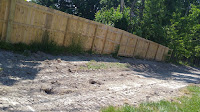In my opinion, the man went a little overboard in some areas.
First of all, he took down and took out all the old dead and dying trees on his side if the already-replaced storm-damaged fence.
He removed falling-down 'structures' and slanting-sideways sheds. (The kids all always wanting to make these rickety traps into clubhouses and such.)
Then he removed where the tree fell across the other trees very near the electrical (and possibly other) wires.

 Then the craziness started. Where he took out the dead trees, he dug up the ground, All the grass and weeds growing right up to the fence have been removed, scraped from the earth itself, leaving a broad expanse of dry brown dirt.
Then the craziness started. Where he took out the dead trees, he dug up the ground, All the grass and weeds growing right up to the fence have been removed, scraped from the earth itself, leaving a broad expanse of dry brown dirt.He removed the entire copse of trees the divided one hillside from the other, where the children play. The trees that held the hill up, I think. Erosion and gravity and the compensation of green growing roots reaching deep and holding it all together.
 |
| after the storm |
 |
| where are the trees |
 |
| invitation to erosion. |
I dread the coming rains, starting with the "brief, but heavy" storms that pop up with summer humidity. The winds that pick up balls and dirt ahead f the downpours. The winds that sometimes come with sunrise and sunset.
I hope that our trailer are far enough away from the resulting quagmires and landslides. (Safe enough from landslides; not so sure about the quagmire between the ends of the trailers and the new fence,)
(And what are the property owners on the other side of that fence going to think and do when the mud runs over into their property?)
What if the resultant mud crosses over to the highway?
What if the mud chokes the lake?
What if a dog or cat or child gets stuck in the soup, sledding down the mudslide?
Only time will tell. Perhaps the brief but heavies will wait until new weeds are grown in. Perhaps there will be no wild winds. Perhaps parents will be able to prevent ALL their children from ALL their mischief.
Stranger things have happened.
Haven't they?